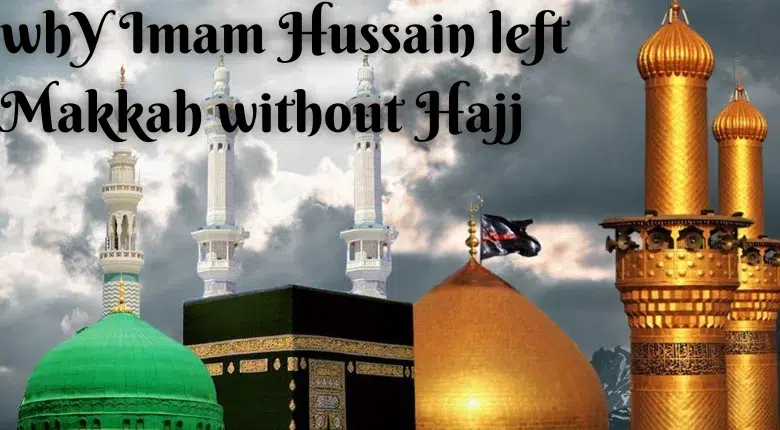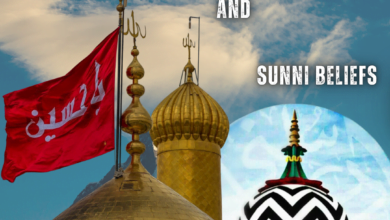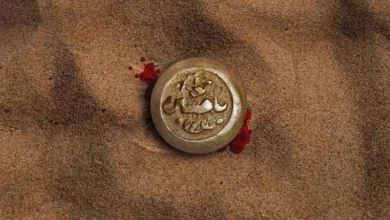8th Zilhajj : Imam Husain’s departure without Hajj

In this article, you’ll know about Imam Husain’s (as) journey from Makkah to Karbala.
- Why Imam (as) abundant hajj?
- Why was Imam (as) left without completing hajj rituals?
- What was the main reason for leaving Hajj?
- What is the greatest slaughter?
- Imam e Hussain (as) and Hazrat Ibrahim (as) connection?
- The real essence of Hajj?
Muslim bin Aqil to Kufa in the middle of Ramazan. From that time till the 8th of Zilhaj, he stayed in Makkah. Imam Hussain (as) and his family planned to perform Hajj in the holy Haram. However, right before the journey began, He abruptly left Makkah without performing Hajj! Imam Hussain (as) was leaving Makkah with his entire family and followers at a time when large throngs were visiting the Holy City for Hajj.
This unexpected occurrence must have raised doubts in everyone’s minds as to why the Holy Prophet’s grandson (peace be upon him and his children) was departing Makkah on the eve of Hajj without doing Hajj.
Why did Imam Husain depart Makkah
After embarking on this spiritual trip to achieve what Allah considers to be one of the highest deeds? Why didn’t he merely wait a few days until he completed the pilgrimage rituals? After all, nothing could be more important than a journey that warrants suspension or cancellation in our human judgment, right?
According to history, the Imam found that some of Yazid’s (La’s) devotees had visited Makkah as pilgrims with the intention of killing Imam Hussain (as) at the Hajj ceremonies with the weapons they concealed under their special pilgrimage clothes (the Ehraam). So Imam Hussain cut the pilgrimage rites short and decided to leave. In the midst of a large audience,
He stood up and said in a speech that he was leaving for Iraq, declared that he would be martyred, and encouraged Muslims to assist him in achieving the goal he had in mind, as well as to offer their lives in the way of God. The next morning, he left for Iraq with his family and a bunch of his close companions.
But it was not his own life that he was afraid of rather, Imam Hussain had his sights set on the life of Islam! The fact that he knew he would be assassinated in Karbala and was practically heading toward his own death is confirmation of this. So, if not for a good motive, why would he interrupt his Hajj just to die in another land?
Main Reason to Leave Kaaba and Hajj Imam Husain as
The primary reason why Imam Hussain left Makkah was that he did not want to be executed in such a way that the oppressors could remain hidden and unnoticed. It would have been impossible to catch the killer, let alone identify the true killer behind the curtains, in the crowd of pilgrims from all over the world.
Secondly, Imam Hussain’s (as) ultimate goal was to expose Yazid (La), and the Imam was determined not to surrender to this corrupt tyrant. As a result, when Imam Hussain (as) left Makkah without completing the Hajj, the subject of why he rejected loyalty to Yazid increased to the center of discussion among all individuals and groups gathered for Hajj.
If the Imam were to be murdered today, it would be considered that Yazid plotted his death, which is exactly what occurred. Yazid is plainly, openly, and directly revealed as the perpetrator of the crimes that were part of that catastrophe, as well as his un-Islamic principles; his beliefs and actions are on display to the world.
The very people who had been silenced by dread and awe of the murdering dictators were affected to the core of their hearts by the tragic events of Karbala, and they began to gather the fortitude to speak out against Yazid. In a relatively short period of time, there was a broad uprising against him and his regime. This was only feasible because of Imam Husain’s (as) perfect execution of his plan of countering Yazid’s aggression with the strength of his character.
It would be incorrect to claim that the Imam (as) skipped or canceled his Hajj that year! Indeed, IImam Husain (as) dropped the ritualistic Hajj in order to accomplish the actual meaning of Hajj, which is symbolized in his sacrifice on the land of Karbala!
Imam Husain (as) reveals that there was a more vital purpose for him to achieve than completing the Hajj ceremonies and risking killing in the Haram. Actually, saying that the Imam skipped or canceled his Hajj that year would be incorrect! In truth, Imam Husain (as) left ritualistic Hajj to perform the actual meaning of Hajj on the land of Karbala, which is symbolized in his sacrifice and carnage!
To be honest, many of the ceremonial activities of Hajj, most notably the slaughter on Eid al-Azha, symbolize the catastrophe of Karbala. Even though we celebrate that day in thankfulness to Allah for sparing the grief of father and son Prophets Ibrahim (as) and Isma’il (peace be upon them) from the slaughter directed by Him, our joy is temporary because it is quickly replaced by the Great Slaughter (as mentioned in 37:104-108 of the Quran) personified in Imam Husain ibn Ali (as).
We experience even more anguish as we recall the agony of separation between Imam Husain AS and his son Ali Akbar (as), which was not spared like Hazrat Ismail (as) and his father. The 10th of Zilhaj is only a few weeks away from the 10th of Muharram, reminding us of the real sacrifice that was offered one month later in Karbala!
When we consider Bibi Hajra’s plight in obtaining water for her son Ismail (as), we are made aware of Imam Husain’s misery in witnessing his youngest son, Ali Asghar (as), die of thirst as he tries his best to seek water from his enemies by raising his newborn in his arms in the hopes of moving their hearts and calming his son’s thirst. Unlike bibi Hajra (as).
Who was relieved when a spring of water flowed to save her son’s life, Imam Husain (as) only discovered a tri-headed arrow to pierce Ali Asghar’s neck! It is said that when bibi Hajra (sa) saw the knife marks on her son’s neck with her own eyes, she fainted one can only imagine the overwhelming emotions Syeda Fatima (saw) felt when she saw her son’s headless body assaulted by the hoofs of the horses after dying of thirst!
When we travel the distance between Safa and Marwa, we are reminded that it is the same distance between Hazrat Abbas ibn Ali’s (as) holy shrine and that of his brother, Imam Husain (as). This exact match in the distance is not a by chance, and it reminds us of the challenge that Hazrat Abbas (as) faced as he attempted to provide water to the dehydrated children who had placed all their hopes in him.
As pilgrims rush to obtain the benefits of Zamzam’s holy water, they should be reminded of the water that Imam Husain was denied till he died of thirst, when even animals are given a last taste before being slain!
The pilgrims in Hajj wear their Ehraam garments for Allah’s sake, and Imam Husain also wore his Ehraam clothes for His sake while sacrificing the joys of this world – only for these “Ehraam” clothes to be soaked in his own pure blood to irrigate the tree of Islam!
The pilgrims repeatedly stone the Shatan emblems in order to dispel the devil’s whisperings, which we are all susceptible to every second of every day. Hurr ibn Yazid al-Riyahi and Umar ibn Sa’d both heard whispers from Shatan about achieving power glory. Hurr, on the other hand, stoned Shatan’s whisperings and took the correct decision to join Imam Husain (as), but Umar followed the whisperings and became a Shatan himself!
When pilgrims arrive in Mina for the final sacrifice, it symbolizes our intention to sacrifice everything dear to us for Allah, just as the Imam (as) did, and the tents are a reminder of his family’s tents, which were burned down and demolished in Karbala after the Great Slaughter!
Pilgrims who visit and walk around the Holy Ka’ba are reminded of the honor Allah showered upon Prophet Ibrahim (as) in rebuilding this honored House of God. They should also be reminded of IImam Husain’s (as) rebuilding of genuine Mohammadan Islam when he offered his pure blood to jump-start this Deen, which was on its path to corruption and deviation.
It is crucial to emphasize that a pilgrim who undertakes Hajj without acknowledging Karbala as its genuine essence will not reap the full benefits of his or her pilgrimage. According to Dr. Ali Shariati, “Imam Husain (as) did not complete his Hajj in order to teach the pilgrims that if there is no Imamat and true leadership if there is no goal, if ‘Hussain’ is not there and ‘Yazid’ is there, making Tawaaf around the house of Allah is equal to making Tawaaf around the idol-house.” (Hajj)
All pilgrims stone the Shatan, carry the robe of Ehraam, walk around the Ka’ba, and walk the distance between Safa and Marwa. However, not everyone who physically stones the Shatan is entirely free of his temptations.
Not everyone who wears the Ehraam has abstained from what Allah has forbidden. Not everyone who sacrifices an animal has their offer truly approved by the Almighty, and only those who give their souls – like IImam Husain’s (as) blessed companions – and demonstrate a willingness to die for the Imam (as) and the purpose he represents have their offer truly accepted by Allah.
Not everyone who raises their voice and says “La ilaaha illAllah” has genuinely recognized the core of Tawheed, and it is only through meeting the criteria that the word of Oneness is truly spoken.
“The Almighty Allah said, ‘I surely am the God besides whom there is no god, so worship Me,” Imam Ali ar-Raza (peace be upon him) conveyed to his followers. whoever comes with a real witness of Tawheed has undoubtedly entered My castle; whoever enters My castle will be safeguarded from My punishment.” When several of the companions voiced their delight at that declaration, Imam Raza quickly responded, “Yes, this is true – with its conditions.
” The objective is to recognize and submit to Imam Husain’s (as) and his descendants Imamat and Wilayat.
If we recognize the core of Hajj as being connected with the sorrow of Karbala, we can comprehend why Allah’s grace extends to pilgrims visiting Imam Husain’s holy shrine on the day of Arafah, even before Hajj visitors!
We shall then explain why, on the day of Arafah, a specific Ziyarat is to be recited for Imam Husain (as), which is one of the most essential deeds that one can perform. We will then realize that it is not a coincidence that one of the keys suggested deeds to be performed on the day of Arafah is to recite the special beautiful supplication of Imam Husain (as) for the day of Arafah, which speaks strongly of Imam Hussain’s (as) level of Irfan and wisdom as he summarises the fundamentals of Tawheed in concise words.
We’ll see why, according to reliable hadith, visiting Imam Husain’s (as) holy shrine is worth 90 Hajj and 90 Umrah performed by the Holy Prophet (pbuh) himself! It is general knowledge that Hajj is compulsory for all Muslims if they have the resources to do so and meet all of the required conditions. Supporting and following in the footsteps of Imam Hussain (as), on the other hand, is necessary and compulsory for every human being at all times, Muslim or non-Muslim!




